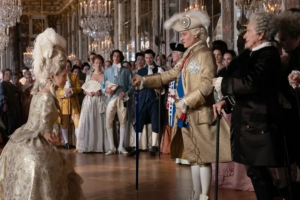Reviewed by GREG KING
Director: James Marsh
Stars: Eddie Redmayne, Felicity Jones, David Thewlis, Harry Lloyd, Charlie Cox, Emily Watson, Simon McBurney, Enzo Cilenti, Maxine Peake.
This biopic looks at the extraordinary life of iconic astrophysicist Stephen Hawking, who was, at the age of 21, diagnosed with the terminal amyotrophic lateral sclerosis – the fatal degenerative motor neurone disease (aka Lou Gehrig’s disease) – and given only two years to live. But Hawking had a determination and a never say die attitude, and was determined to prove much in the short time he had left. His brain was still active, even though his body became progressively more debilitated by the ravages of the terrible disease.
The film charts Hawking’s deterioration. After contracting pneumonia, Hawking lost his power of speech, but undeterred he worked with a speech therapist named Elaine, and was also given a robotic speech program that gave him that distinctive sound that is as much a part of his personality as the electric wheelchair.
He seemed to be galvanised by the death sentence and threw himself into his work, and over the next few years he devised a number of influential and groundbreaking theories about black holes, the origins of the universe, and string theory. He published books, including the best selling A Brief History Of Time in 1988, and received numerous awards and accolades for his work. And of course he is still alive fifty years after receiving that diagnosis.
But The Theory Of Everything is also a moving and tender love story, as it explores the relationship between Hawking and fellow Cambridge student Jane Wilde (played by Felicity Jones). She initially supported him as he broke new ground in scientific research and our understanding of the universe.
When Jane first agreed to marry Hawking she thought she would only have to deal with his illness for a couple of years. But as time went on she began to feel a little frustrated and increasingly trapped in the relationship. She joins a church choir where she meets piano teacher Jonathan (Charlie Cox), and a strong bond develops between them that eventually puts a strain on her marriage to Hawking.
The film itself is based on Jane’s book Travelling to Infinity: My Life with Stephen, so it explores many events from her perspective and softens some of the darker and more controversial aspects of their relationship. Apparently it took screenwriter Anthony McCarten three years to convince Jane to let him adapt her book for the screen. This is after all meant to be a crowd pleasing, feel good film. There is plenty of humour here too as Hawking retained a keen wit and sense of play despite his disease.
In exploring the life of a gifted but flawed genius and his personal struggles with illness, The Theory Of Everything has some obvious parallels with Ron Howard’s Oscar winning A Beautiful Mind. And even though the film explores some ambitious scientific concepts, director James Marsh ensures that they are accessible to the audience, unlike the science and intellectual theories of the recent Interstellar, which left many scratching their heads.
Marsh comes from a background in documentaries (Man On Wire, Project Nim, etc), but he is also very capable of handling drama, as he proved with the dark psychological drama The King, and the tense IRA thriller Shadow Dancer. His direction here is sensitive and restrained, and he draws a superb performance from Eddie Redmayne (from Les Miserables, etc) who plays Hawking. Redmayne has done a lot of theatre and television work but is less well known for his film roles. Many will probably remember him from My Week With Marilyn, in which he played a love struck teen working on the set of the 1957 film The Prince And The Showgirl. Here he undergoes a remarkable physical transformation, with his body contorted and twisted to capture Hawking’s shrunken form.
Like Daniel Day Lewis with My Left Foot, this is a remarkable performance, and Redmayne totally inhabits the character of Hawking. Playing a character with a disability is often seen as Oscar bait material. On the strength of his work here though Redmayne must be considered a sure thing to collect the Oscar, having already earned a swag of awards for his performance.
Matching him is Jones, who delivers a heart wrenching but honest performance. She captures Jane’s strength and determination, her passionate nature and her tenacious efforts to retain her own sense of identity while dealing with the stress of caring for Hawking. But she also manages to convey that sense of frustration she feels at being trapped in a marriage.
The pair establish a powerful and touching chemistry and dynamic that elevates the film. David Thewlis is also very good as Hawking’s university professor, who encourages his pursuits.
Technical values are all first class, from Benoit Delhomme’s luminous cinematography to Johann Johannsson’s moving score.
★★★☆




